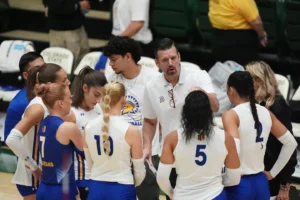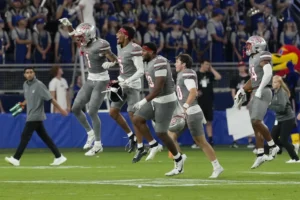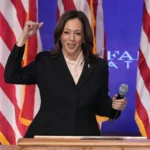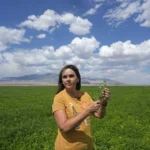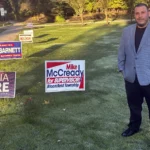UW Bans Church Elder, Prompting Free Speech Outcry
Laramie man’s campus demonstration specifically targeted transgender student
- Published In: Other News & Features
- Last Updated: Jan 17, 2023

University of Wyoming first-year student Keely Kidd organized a protest against university policies after a church elder targeted a transgender student with a sign on campus. In banning the elder from the student union, Kidd said UW "did the right thing taking the stand against him to protect its students, but it's not enough.” (Courtesy photo from Keely Kidd)
By Ellen Fike
Special to the Wyoming Truth
The University of Wyoming’s move to ban a Laramie church elder from its student union last month has sparked a First Amendment debate on campus and across the state.
Kevin Goldberg, a First Amendment specialist with the Freedom Forum Institute in Washington, D.C., said the elder’s rights have been violated, and some conservative Wyoming legislators agree.
But some LGBTQ students at UW believe administrators should be more concerned for their welfare and question whether the campus will be safe and welcoming for their community when classes resume Tuesday.
The controversy began on Dec. 2, when Todd Schmidt, an elder with the Laramie Faith Community Church, displayed a sign on a table at the campus’ student union that said “God created man and woman and [student’s name] is a man.”

The student referenced is a transgender female and recent inductee into the Kappa Kappa Gamma sorority, a move that has caused controversy among more conservative legislators in the state, who have referred to the student as “a man” and questioned the safety of this move.
Schmidt’s sign quickly caused a stir, prompting arguments between Schmidt and students passing through the Wyoming Union. Ultimately, university officials asked him to remove the individual’s name, as many students considered the move to be transphobic. Schmidt complied but was not removed from the campus.
Days later, 70 students participated in a silent demonstration in support of the LGBTQ+ community and to protest university policies that kept Schmidt from seeing harsher consequences.
UW freshman Keely Kidd, who uses they/them pronouns, was the organizer of the protest.
“The protest wasn’t necessarily against Todd,” Kidd, a first-year student, told the Wyoming Truth. “It was also against the university’s response and how unsafe queer students have felt on campus before and after the incident in the union.”
However, Schmidt was later suspended from having table privileges in the student union for one year. In a statement, UW President Ed Seidel said Schmidt violated the university’s policy prohibiting discrimination and harassment.
“While freedom of expression is cherished on this campus and across this nation, a line was crossed when a student was harassed by name,” Seidel said. “This is something we will not tolerate on this campus, and this action speaks to that key principle to which we adhere at UW. We do not tolerate harassment of any student or any university community member.”
When reached for further comment, UW spokesman Chad Baldwin pointed back to Seidel’s original statement.
First Amendment violation?
Goldberg, the First Amendment expert, said that while he does not agree with Schmidt’s actions, UW violated his First Amendment rights by suspending him from the student union.
“The university has clearly engaged in viewpoint discrimination, no matter how you define the situation,” Goldberg told the Wyoming Truth. “It seems to be that they are picking sides of the discussion, which is the worst thing the university could do.”
Goldberg explained that since the university has designated public forums on campus, Schmidt is allowed to have a table in that space and express his opinions, whether students agree with them or not.
While calling the transgender student by their birth name instead of their preferred name might be considered socially unacceptable, it is not hate speech or fighting words, both of which would be restricted under the First Amendment, Goldberg said.
“I’m extremely sympathetic to this individual that the elder is talking about,” Goldberg said. “But as a First Amendment specialist, the elder had the right to speak. The First Amendment protects our right to be obnoxious.”
If Schmidt were to move forward with a lawsuit, Goldberg believes Schmidt could have a solid case against the university.

Goldberg said Schmidt’s right to engage in free speech has been violated due to the ban. But, he noted that arguably, Schmidt’s right to peaceably assemble and exercise his religion might have also been violated.
Neither Schmidt nor the transgender student responded to requests for comment.
Wyoming legislators respond
Meanwhile, 25 Wyoming Republican legislators penned a letter to UW officials regarding the incident with Schmidt, calling on administrators to “condemn” the transgender student’s induction into the sorority and to reverse the ban against Schmidt.
“Open dialogue and bold pursuit of reality is the proper environment for higher education, not safe spaces,” the legislators wrote. “The recitation of a 3,000-year-old writing is hardly shocking and is not hate speech.”
The group of legislators who signed the letter included Secretary of State Chuck Gray, Sen. Lynn Hutchings (R-Cheyenne), Sen. Cheri Steinmetz (R-Lingle) and Rep. John Bear (R-Gillette), to name a few. Rep. Chip Neiman (R-Hulett) penned a separate letter in support of his fellow lawmakers.
In an interview with the Wyoming Truth, Bear called Schmidt’s ban “egregious.” He believes UW officials banned Schmidt due to an outcry from the student newspaper The Branding Iron.
“The first thing I’d like to see is that [UW officials] reverse the decision and allow the elder to continue the 20 years he’s had a table [on campus],” Bear said. “If they don’t, then I would support an effort to reduce funding to the university until they get the picture.”
University officials stood firm in their decision to ban Schmidt.
Bear also expressed concerns about the university determining what a “protected class” (transgender people) is when the class is not already in university statute.
Moving forward
Back at UW, Kidd said they toured many colleges before choosing UW, in part because of the prominence of its Rainbow Resource Center and Multicultural Affairs Office.
“It wasn’t like that at the other schools I was considering,” Kidd said. “But now that this [Schmidt incident] has happened, will students even feel comfortable associating themselves in these areas? Will it feel like being in those spaces, which are supposed to be safe spaces, might be putting targets on our backs?”
Kidd said the Schmidt incident reflects badly both on the university and Laramie, pointing out that Schmidt is not banned from the entire campus, just the student union.
“He’s [still] allowed to preach his rhetoric on campus, which I think is even more dangerous,” they said. “In planning the protest, I had people talking about how queer students were warned whenever he was in the union so he could be avoided. Now that he is not allowed in the union, he can be anywhere at any time.”
Kidd said university officials should look after its students first, rather than one person who is not affiliated with the school.
“I think that free speech comes with consequences,” they said. “He chose to target a student and harass them. The University did the right thing taking the stand against him to protect its students, but it’s not enough.”

